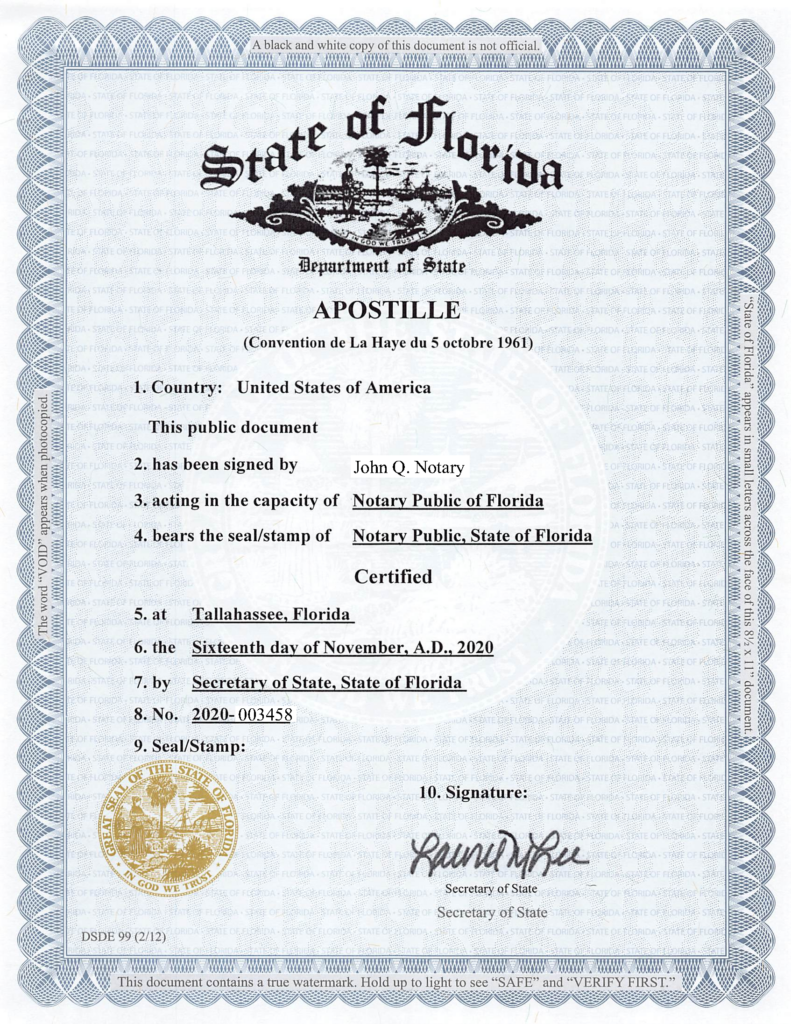Looking Into the Reasons Behind the Required Requirement of Apostille Accreditation for Legal Papers
In the realm of legal paperwork, the obligatory need of apostille qualification has become a vital aspect that substantially affects the validity and recognition of legal documents on a global scale. Understanding the rationale behind this requirement includes diving into the complex web of legal complexities, historic criteria, and global arrangements that highlight the relevance of apostille qualification in today's interconnected globe. By checking out the underlying reasons behind this prevalent requirement, a more clear photo arises of why this relatively governmental process holds such enormous significance for organizations, federal governments, and people alike.
Historic Advancement of Apostille Accreditation
How did the idea of apostille qualification evolve over time to become a crucial part of international file recognition? The demand for a streamlined method of validating files for usage throughout borders became evident as global profession and traveling raised.
Initially adopted by a few European nations, the Apostille Convention slowly got international approval as a result of its performance and performance in validating the authenticity of main documents. Throughout the years, the convention's reach increased as even more nations joined, identifying the apostille as a globally approved kind of document authentication. Today, apostille accreditation has actually come to be a standard requirement for validating lawful documents in global purchases, making sure smooth interaction and legal proceedings between countries.
Simplifying International File Legalisation
The streamlining of international file legalisation procedures has substantially enhanced effectiveness in cross-border deals. Streamlining the process of legalizing papers for global use has ended up being crucial in helping with swift and smooth deals between countries. Among the vital mechanisms that have added to this simplification is the adoption of the Apostille Convention, which supplies a standard approach for verifying the authenticity of files across taking part countries.
By sticking to the Apostille demands, nations accept identify each various other's public documents as valid without the need for further legalization. This eliminates the commonly difficult and extensive procedure of several verifications by different authorities, saving time and resources for individuals and companies taken part in global tasks.

Making Certain Document Credibility and Credibility
To make certain the credibility and validity of lawful papers in worldwide transactions, rigorous verification processes are essential - Houston Apostille. Lawful documents play an important role in cross-border ventures, and ensuring their legitimacy is vital to support the integrity of such deals. By requiring apostille qualification for legal documents, authorities aim to confirm the origin of documents and Recommended Site confirm the signatures of individuals entailed. This process helps stop fraud, misstatement, and other negligences that could endanger lawful procedures or global agreements.
Moreover, verifying the credibility of lawful papers with apostille accreditation enhances trust and self-confidence amongst events engaging in worldwide purchases. Inevitably, by maintaining rigorous confirmation standards, apostille qualification contributes to an extra clear and safe and secure worldwide legal structure.

Assisting In Cross-Border Legal Recognition
In the realm of global purchases, the apostille accreditation not only ensures the credibility and credibility of legal documents yet likewise plays a critical role in promoting cross-border lawful recognition (Houston Apostille). When lawful documents bear an apostille certification, they are conveniently accepted by foreign authorities without the demand for additional verification. This structured procedure accelerates the recognition of files in different nations, promoting effectiveness and reducing governmental obstacles in legal issues that go beyond nationwide limits
Helping with cross-border lawful recognition via apostille accreditation cultivates depend on and self-confidence in the authenticity of records exchanged in between countries. This recognition is specifically critical in scenarios such as global company this hyperlink purchases, adoption processes, or lawful proceedings including events from different territories. By sticking to the standards stated by the Apostille Convention, countries accept recognize the apostille seals affixed to files from various other member nations, hence simplifying the process of lawful acknowledgment across borders. Inevitably, the apostille certification serves as a browse around this web-site basic device in promoting seamless worldwide lawful cooperation and making sure the smooth procedure of cross-border purchases.
Compliance With International Treaty Specifications
Conformity with global treaty standards is vital for making certain the uniform application of lawful guidelines throughout participating countries. The Apostille Convention, developed in 1961, describes the requirements for the approval of public files among member countries.
The Apostille qualification, as mandated by the treaty, acts as a guarantee of authenticity for documents such as birth certifications, marriage licenses, court judgments, and notarized deeds. This standard approach helps prevent fraud and makes sure that legal papers originating from one participant nation are readily approved in an additional. In addition, by complying with worldwide treaty standards, countries show their dedication to maintaining the principles of transparency, count on, and cooperation in legal matters on a worldwide scale.
Final Thought

In the world of lawful documents, the required need of apostille qualification has actually come to be a necessary element that considerably affects the validity and acknowledgment of legal papers on a worldwide scale. Today, apostille accreditation has actually come to be a typical requirement for verifying lawful papers in worldwide transactions, making sure smooth communication and legal proceedings between countries.
Furthermore, confirming the authenticity of lawful files with apostille accreditation improves count on and self-confidence among parties engaging in international transactions.In the world of worldwide purchases, the apostille certification not just guarantees the credibility and credibility of lawful papers however also plays a crucial role in helping with cross-border lawful acknowledgment. By adhering to the standards set forth by the Apostille Convention, countries concur to recognize the apostille seals fastened to records from various other participant nations, thus simplifying the process of legal recognition throughout boundaries.